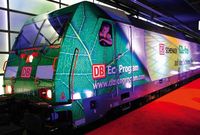Audi Rails Against Inefficient Performance Right From the Start
MILTON KEYNES, UNITED KINGDOM – Aug 20, 2010: Audi is blazing yet another trail in the all-important battle to minimise the car’s environmental impact by using trains powered by green electricity to transport its now 36-strong model range from its headquarters in Ingolstadt, Germany, to the North Sea loading port of Emden. This innovative logistics concept is a pioneering step for the industry and an important element of Audi’s strategy of ensuring that production is sustainable in all areas.
“CO2-free rail transport is an important element of our environmental efforts and is of great interest to us,” says Ernst-Hermann Krog, Head of Audi Brand Logistics.
From this month, the Vorsprung durch Technik brand is operating its transport trains on the Ingolstadt – Emden route with electricity from renewable energy sources. This allows Audi to eliminate the emission of around 5,250 tons of CO2 per year, more than 35 kilograms (77 lb) per car transported. The line to the North Sea loading port, the hub for overseas exports, is the brand’s most important transport route. Three trains loaded with Audi models travel this route each day and carry roughly 150,000 cars a year.
The CO2-free rail freight transport concept Eco Plus is a new offer from DB Schenker, the logistics area of German railway operator Deutsche Bahn. The energy required is replaced entirely by renewable energy from Germany. The electricity is bought in additionally by Deutsche Bahn, meaning that emissions are avoided right from the start.
The additional costs incurred compared to conventional electricity are borne by Audi; DB Schenker uses a portion of these for targeted projects in the field of renewable energies. Green electricity only comprises around 18.5 percent of the German rail electricity mix, with conventional energy sources in the form of coal-fired, nuclear and natural gas-fired power plants currently dominating. The green electricity required for transport is an additional component fed into the grid for Eco Plus from DB Schenker, thus the share of green electricity in Germany will increase.
Audi is of course also going to great lengths to ensure that the cargo carried by these efficiency focused trains is as gentle as possible on the environment. Its range already contains 53 engine and transmission variants that have CO2 emissions of less than 140 g/km. Of these, 19 versions achieve CO2 emissions of less than 120 g/km, and three of less than 100 g/km



